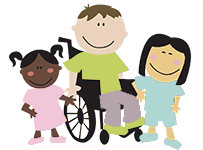[vc_row][vc_column width=”1/2″][vc_column_text]Autism is a developmental disorder. It is primarily associated with problems with social interactions, not communicating verbally or non-verbally correctly, and behavioral problems. Some of these problems include repetitive behaviors and interests that have a very narrow focus. Autistic children can have varying degrees of symptoms.
While the disorder itself cannot be cured, the good news is that therapies have been developed that can help a child with autism better integrate with their peers, their family members, and those around them. In this article, we will focus on a broad look at the three major types of autism spectrum disorders.[/vc_column_text][/vc_column][vc_column width=”1/2″][vc_column_text] [/vc_column_text][/vc_column][/vc_row][vc_row][vc_column][vc_column_text]
[/vc_column_text][/vc_column][/vc_row][vc_row][vc_column][vc_column_text]
Autistic Disorder
Autistic Disorder is what would be considered “classic” autism. It is also the most severe form of autism. The symptoms of Autistic Disorder are what most people think of when someone is said to be autistic. One of the first hints that a child has Autistic Disorder is a delay in language development. By the age of two they should be speaking and able to communicate their needs to you and understand what you are asking of them. Children with Autistic Disorder may have trouble making friends because they are unable to recognize the social clues needed to do that. They may also engage in restrictive or even rigid behavior. They also may seem to be engaged in repetitive behavior that is almost compulsive.
Asperger Syndrome
Asperger Syndrome is a milder form of autism. Children with Asperger Syndrome do not have the problems with language and communication that those with Autistic Disorder have. They are able to make their needs known and can understand what others want of them. Many people with Asperger Syndrome are not affected by intellectual disabilities that do affect those with Autistic Disorder.
People with Asperger Syndrome have trouble with social interactions. They may be tied to specific schedules or ways of doing things. Upsets in their routine can cause them difficulties. They frequently have problems with understanding social clues and may not understand simple social norms, such as invading someone’s personal space. They are also subject to hypersensitivities such as light and sound.
However, they do have certain strengths which are tied to their intellectual ability such as being able to maintain a strong focus, pay attention to detail, and excellent pattern recognition abilities.
Pervasive Developmental Disorder
Pervasive Developmental Disorder is an atypical form of Autism. This diagnosis is determined when a person meets some of the criteria for Autism Disorder and Asperger Syndrome, but do not meet all of the criteria of either of these disorders. This is considered the mildest form of Autism and generally causes only social or communication problems.
If you think you have a child who exhibits any of these symptoms, contact Speech & Occupational Therapy of North Texas. We have several clinics in the North Texas area and have been helping families with an autistic child for almost 20 years.[/vc_column_text][/vc_column][/vc_row]
